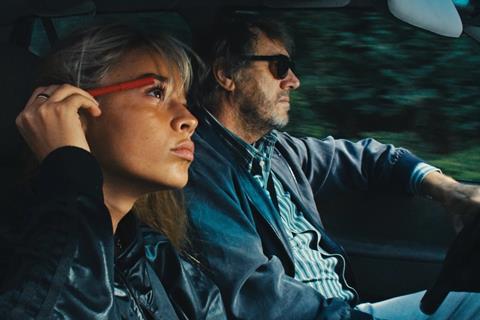Deadpan humour steers this freewheeling but slow-burn noir

Dir: Claude Schmitz. Belgium, France. 2023. 117 ins.
A hangdog private detective specialising in divorce encounters double trouble in The Other Laurens, a self-consciously offbeat feature from Belgian writer-director Claude Schmitz. Twistily convoluted in proper neo-noir style, the crime yarn — leavened by dollops of deadpan humour in the Coens’ vein — should secure further festival play after its Director’s Fortnight premiere, and perhaps an arthouse release in Francophone territories. Although the film’s cool vibes and stylish visuals, accompanied by an eclectic, mainly electronic soundtrack, are striking, the film itself never quite meshes into a satisfying whole, Schmitz — whose 59-minute Carwash (2019) landed him the Prix Jean Vigo for rising talent — nevertheless remains a name to note.
Cool vibes and stylish visuals
His numerous skills include a confident handling of performers in what amounts to quite a sprawling ensemble, though main focus is on the ever-busy, ever-dependable Olivier Rabourdin as world-weary Brussels P.I. Gabriel Laurens. In the immediate aftermath of his aged mother’s death, he is contacted by his teenage niece Jade (Louise Leroy, making a vivid impact in her screen debut) regarding the death of her father Francois in a car crash – Francois is, or was, Gabriel’s identical twin.
Heading somewhat reluctantly to Perpignan, where the mega wealthy Francois lived in palatial splendour with his attractive American wife (and Jade’s stepmother) Shelby (Kate Moran), Gabriel soon finds himself enmeshed in an imbroglio of nefarious criminality. If Gabriel is somewhat confused, so is the viewer — though this may well be a deliberate ploy on the part of Schmitz and his co-writer Kostia Testut, whose brotherly-revenge conceit owes much to Mike Hodges’ labyrinthine British crime-classic Get Carter (1971).
Schmitz and company many of whom worked on his 2021 feature-length debut Lucie Loses Her Horse) wear such influences and homages on their sleeve, kicking off with a prologue which stealthily, wrongfootingly and quite brilliantly updates the opening scene of Hamlet to modern-day rural Spain. This Shakespearean curtain-raiser proves to be a total red herring, however: it turns out there’s almost nothing to connect the melancholy Dane’s travails with the vaguely fable-like shenanigans endured by Gabriel and company.
While the main narrative is only haltingly engaging, there are plentiful compensations and distractions along the way as the picture ambles at a slow-burn pace towards a heavily signposted violent finale. Cinematographer Florian Berruti crafts a parade of eye-catching images, notable for their bold hues and occasional mild stylisation — the latter effect further boosted by Mathieu Buffler’s busy but organic production-design.
MVP, however, may well be composer Thomas Turine, whose score is dominated by ominously, infectiously throbbing electronic beats. His pieces are blended effectively with some guitar-tracks by French eminence Rodolphe Burger, who also pops up on camera as a corrupt cop with the unlikely moniker “Alain Crab.” His banter with colleague Francis (Francis Soetens) has a beguilingly freewheeling air of improvisation — this quirky duo endow proceedings with a welcome dose of countryside-comedy.
Production companies: Wrong Men, Chevaldeuxtrois
International sales: Best Friend Forever, sales@bffsales.eu
Producers: Benoit Roland, Jeremy Forni
Screenplay: Claude Schmitz, Kostia Testut
Cinematography: Florian Berutti
Production design: Mathieu Buffler
Editing: Marie Beaune
Music: Thomas Turine
Main cast: Olivier Rabourdin, Louise Leroy, Kate Moran, Marc Barbe, Tibo Vandenborre, Rodolphe Burger, Edwin Gaffney
























